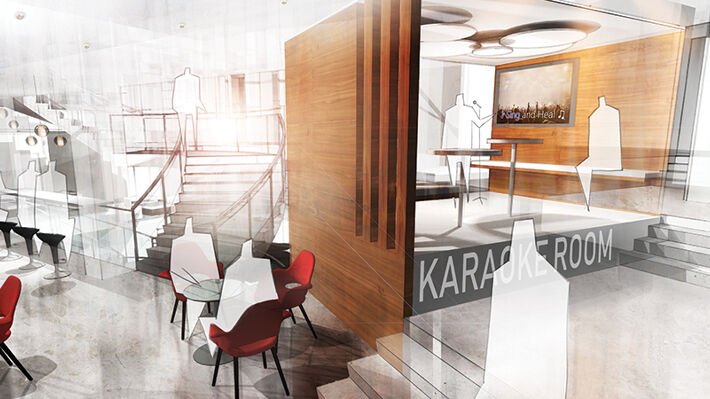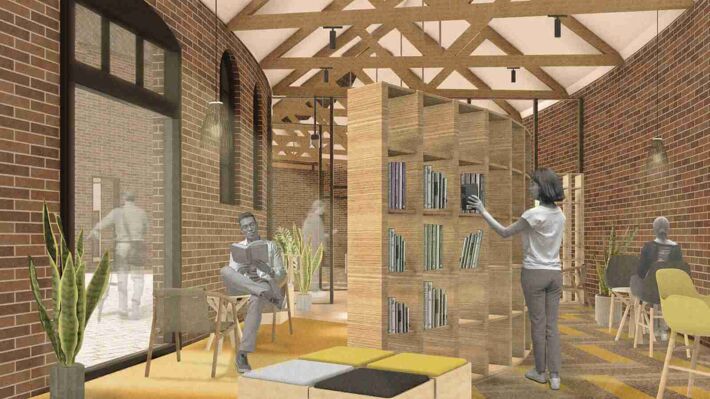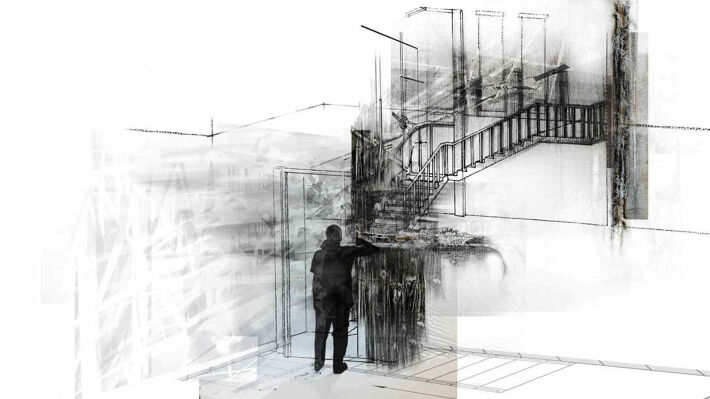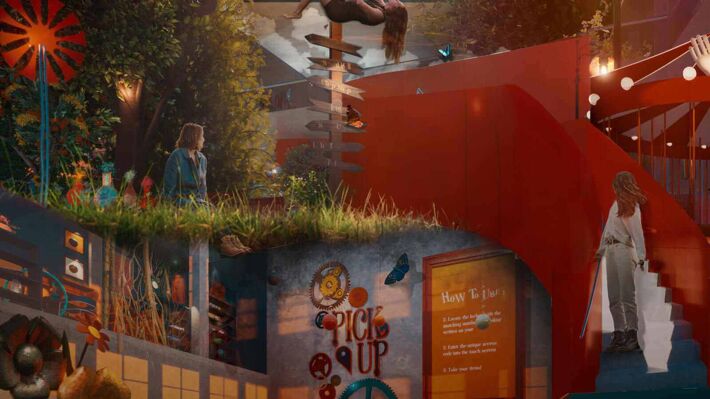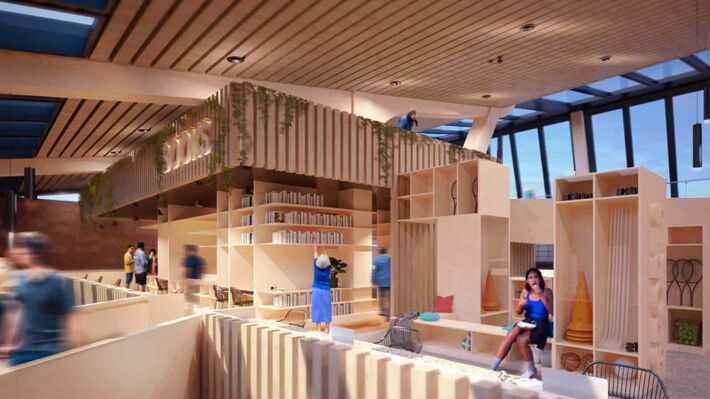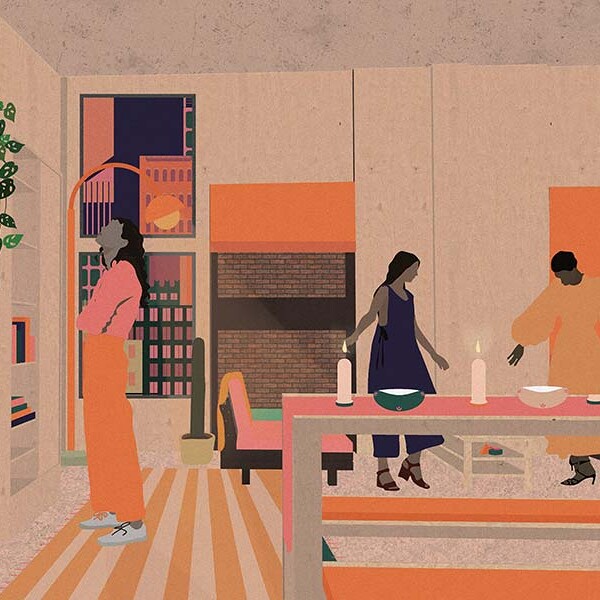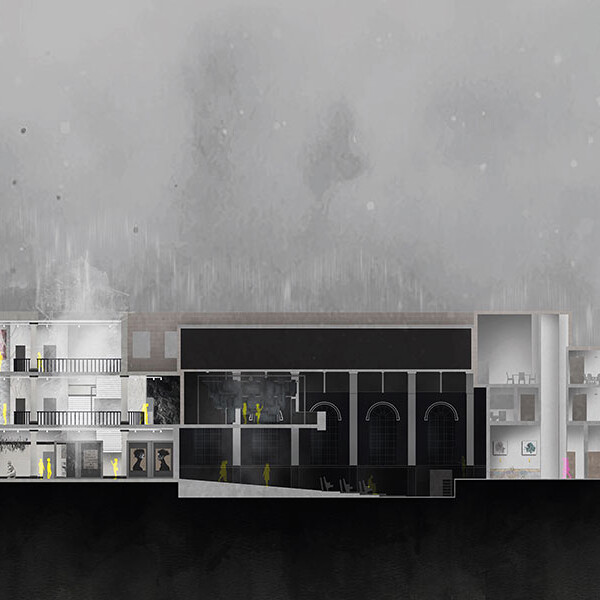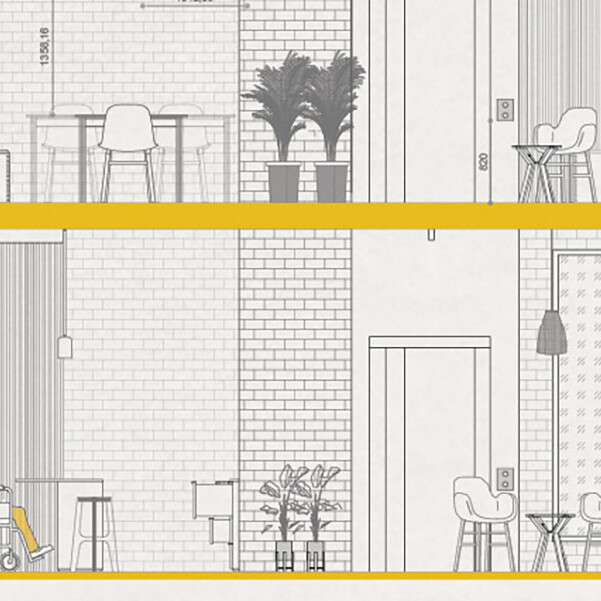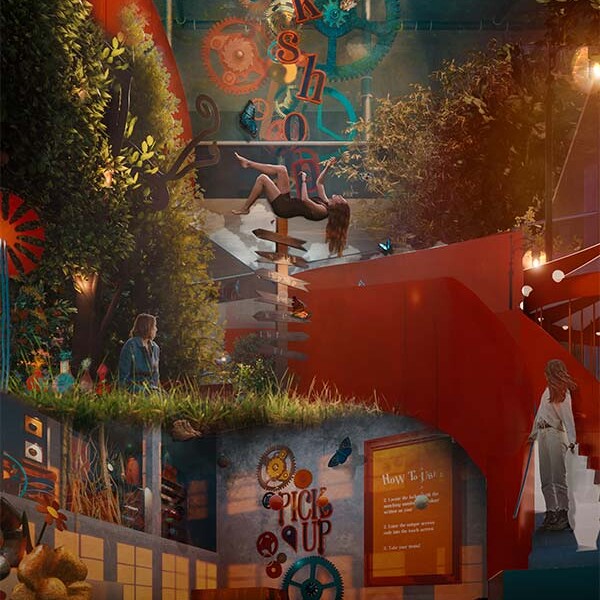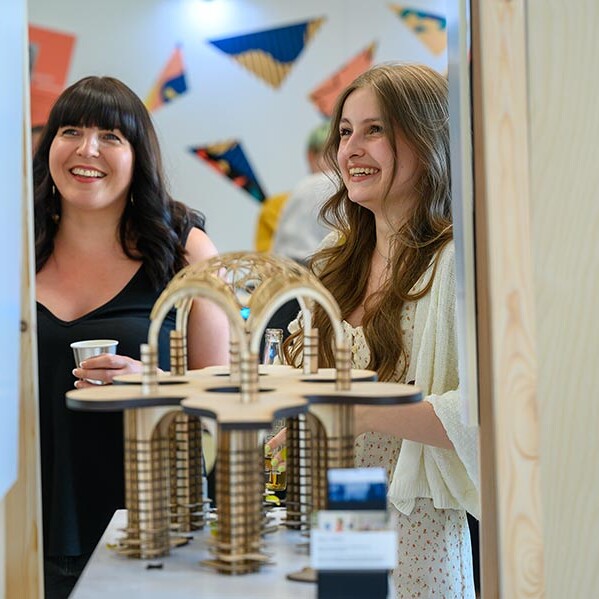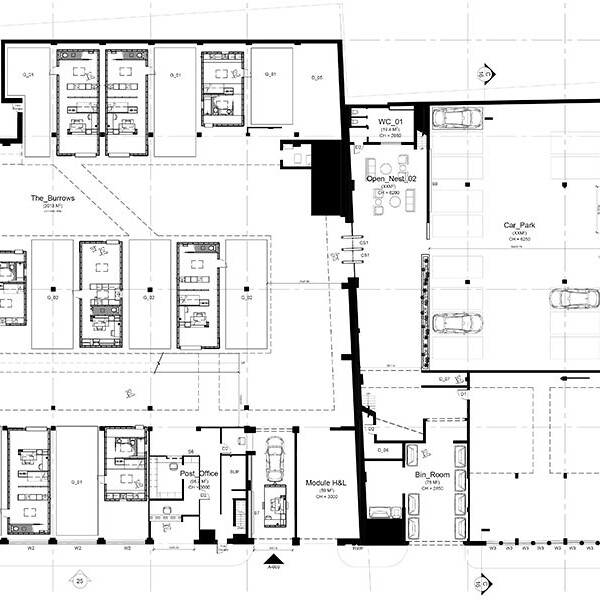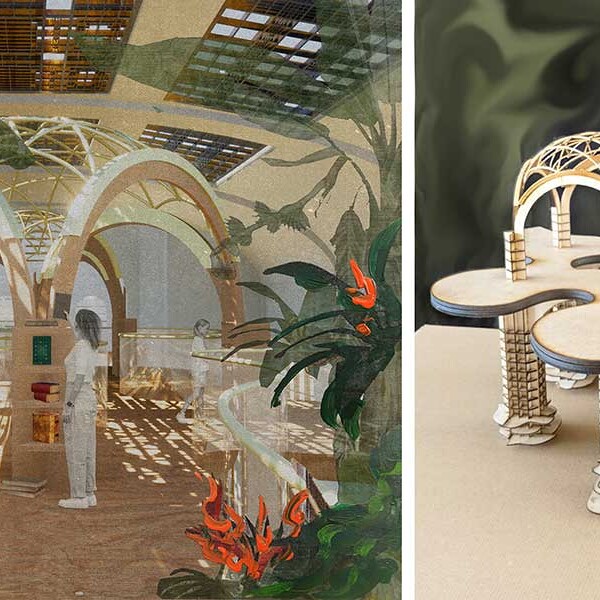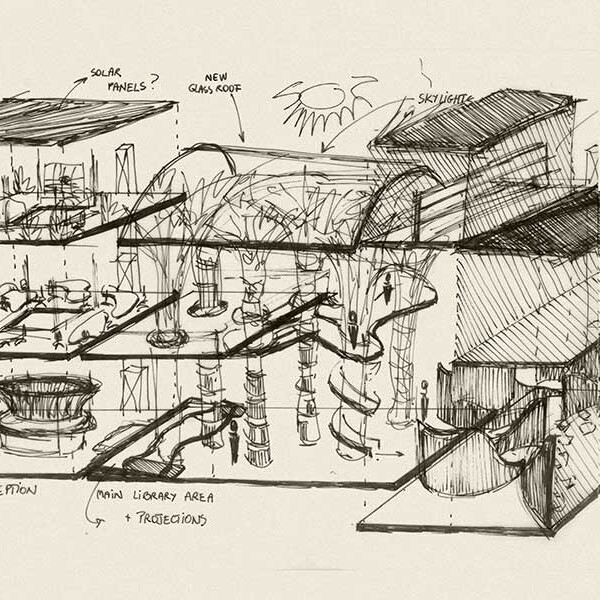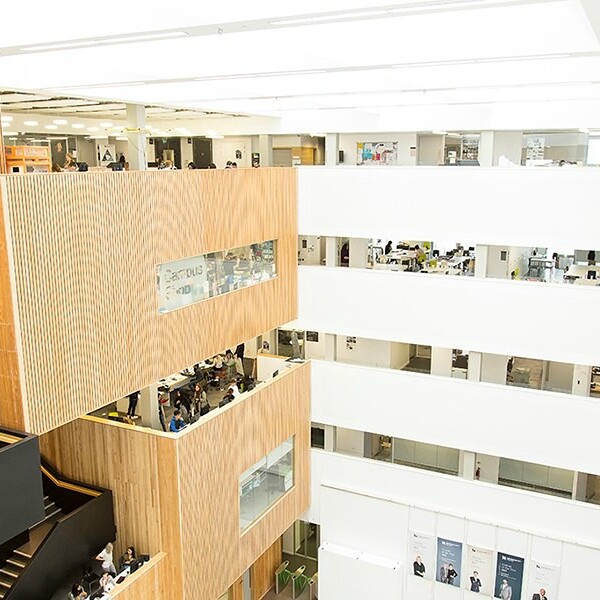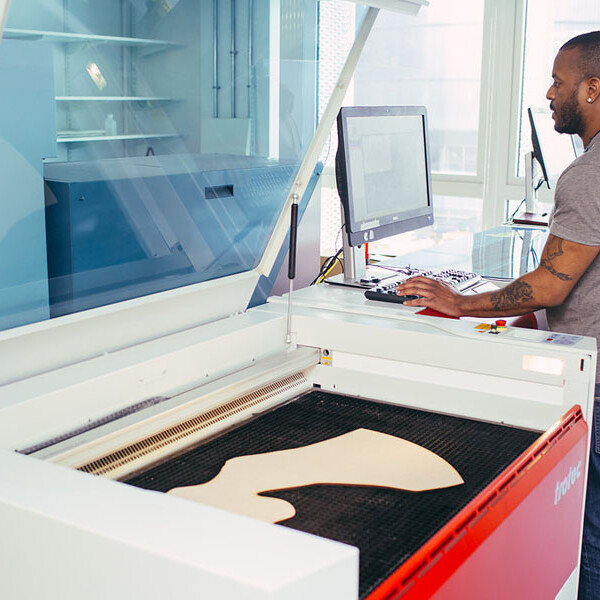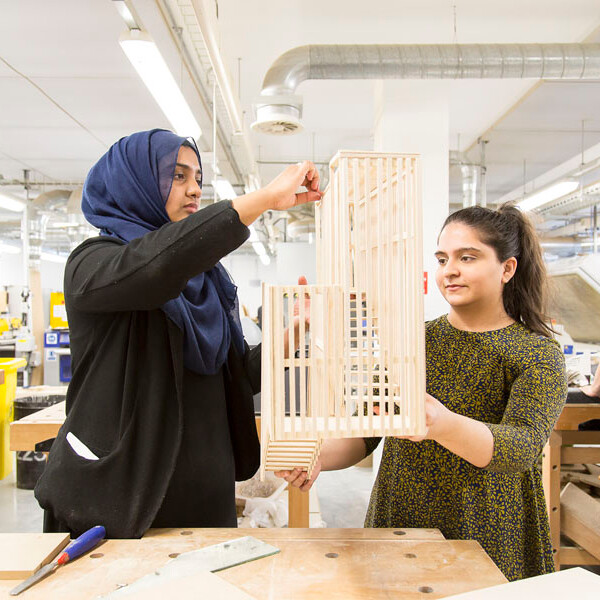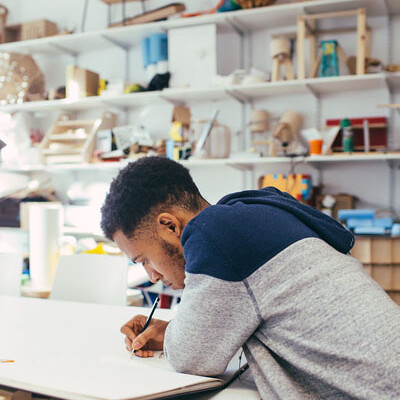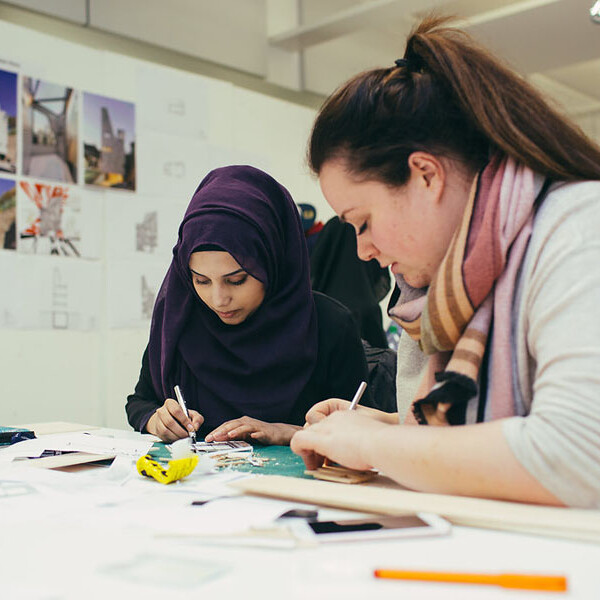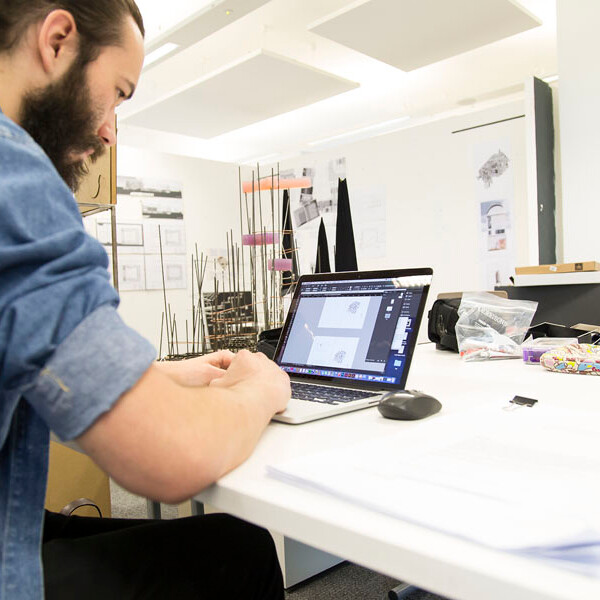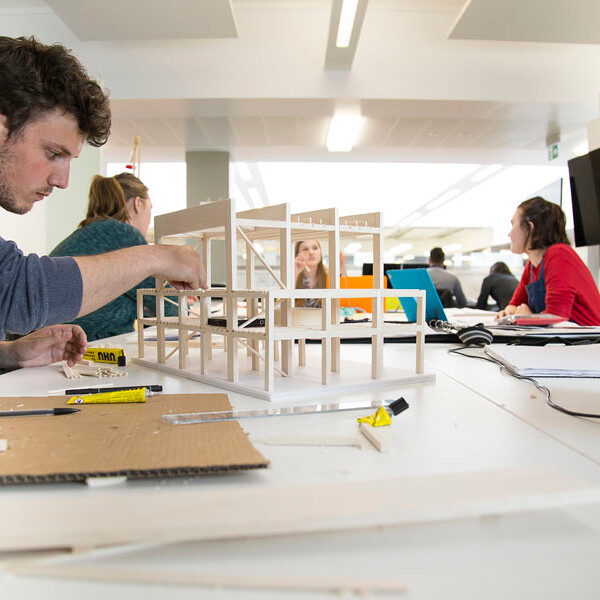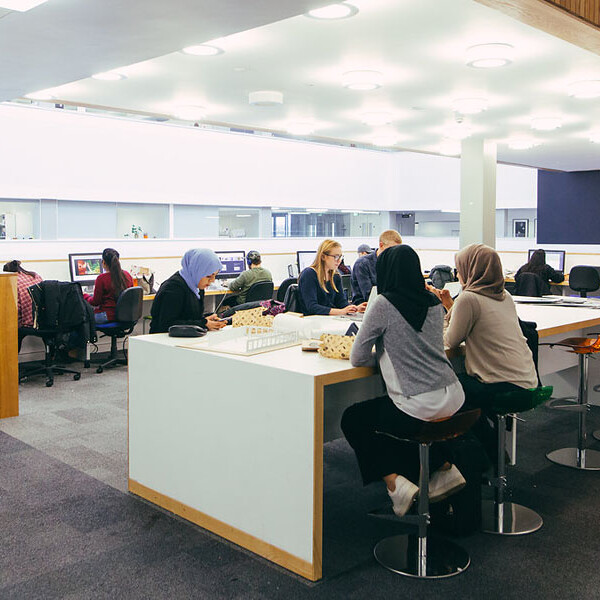Interior Architecture and Design - BA (Hons)
Currently viewing course to start in 2025/26 Entry.
The mission of this innovative Interior Architecture and Design course is to develop autonomous agents of positive change. Our graduates leave capable and eager to define their own career path, equipped with capabilities to challenge the status quo and able to thrive in ever-changing contexts.
- Level Undergraduate
- Study mode Full Time
- Award BA (Hons)
- Start date September 2025
- Fees View course fees
- Subject
- Location City Centre
This course is:
Available with Professional Placement year
Open to International Students
Overview
Do you want to learn how to transform spaces? This innovative Interior Architecture and Design degree course covers a broad range of design possibilities, ranging from reordering to transforming space. Our course will provide you with the facilities and education that you’ll need to succeed within the industry, as well as offering excellent opportunities for interdisciplinary collaboration and networking with industry partners.
What's covered in this course?
Our BA (Hons) Interior Architecture and Design course provides you with the skills to transform or give new life to spaces, as well as teaching you how to plan and design creative interiors.
You will look at hierarchies and relationships between different spaces, describing these relationships in new ways. This industry-aligned degree course offers you the opportunity to study and practise the adaption and re-use of space within new and existing building stock, while also addressing aesthetics, human needs, materiality and more, as well as the ephemeral qualities of atmosphere, character, colour, light and shade.
Alongside the regeneration of existing space, you will discover new interior environments, in a broad range of industry sectors, such as hospitality, retail, leisure and residential, using an experimental approach to design to develop the refined techniques required for effective space planning, conceptual design, development, visualisation and the refurbishment of space.
Professional Placement Year
This course offers an optional professional placement year. This allows you to spend a whole year with an employer, following successful completion of your second year, and is a great way to find out more about your chosen career. Some students even return to the same employers after completing their studies.
If you choose to pursue a placement year, you will need to find a suitable placement to complement your chosen area of study. You will be able to draw on the University’s extensive network of local, regional, and national employers, and the support of our Careers teams. If you are able to secure a placement, you can request to be transferred to the placement version of the course.
Please note that fees are payable during your placement year, equivalent to 20% of the total full-time course fee for that year.
I now know how much I can achieve if I put all my heart into it. My knowledge about Interior Design is now stronger and I can do so much more. I have achieved what I was striving for.
Izabela Bartlomiejczyk, graduate
Why Choose Us?
- 90% of students rated the teaching on this course as good or very good (NSS 2024).
- During each year of study you will be working closely with our team of industry professionals that dedicate time each week to working alongside you as students, helping to align all projects and work output with the industry standards, and in context of present day projects.
- Interior Design is a field that draws on many other fields to inform itself, such as the arts, literature, film, photography, fashion, etc. and so, by its nature, touches many disciplines. One of our objectives is to provide our students with an interdisciplinary approach to the discipline of Interior Architecture and Design through different collaborations with lecturers and students of other subjects within the University. These collaborations will enable you to explore different strategies to face an Interior architecture/design project based on transferable skills from different disciplines.
- You will benefit from study trips, which could include design-focused European Cities, and/or Clerkenwell and The London Design Festival. You will also work with our industry connections, have the opportunity to be featured in Dezeen, as well as the chance to enter international design competitions.
- Two-thirds of the impact of our research was judged to be very considerable (3*) or outstanding (4*) - REF2021
- The College of Architecture is highly respected and has a rich history of providing education and opportunities.
Open Days
Join us for an Open Day where you'll be able to learn about this course in detail, chat to students, explore our campus and tour accommodation. Booking isn't open for this event yet, register your interest and we'll let you know as soon as booking goes live.
Next Open Day: 28 June 2025
Entry Requirements
These entry requirements apply for entry in 2025/26.
All required qualifications/grades must have been achieved and evidenced at the earliest opportunity after accepting an offer to help confirm admission and allow for on-time enrolment. This can also include other requirements, like a fee status form and relevant documents. Applicants can track their application and outstanding information requests through their BCU mySRS account.
Essential requirements
- Standard offer: 120 UCAS Tariff points. Learn more about UCAS Tariff points.
- Accelerate offer: 80 UCAS Tariff points. Find out more about BCU Accelerate.
Applicants will also need to submit a good portfolio.
If you have a qualification that is not listed, please contact us.
Don’t meet our entry requirements?
You could apply for a foundation course or a course at our International College. These routes have lower entry requirements and act as the bridge to a full degree. To find out more, please select your status:
Fees & How to Apply
UK students
Annual and modular tuition fees shown are applicable to the first year of study. The University reserves the right to increase fees for subsequent years of study in line with increases in inflation (capped at 5%) or to reflect changes in Government funding policies or changes agreed by Parliament. View fees for continuing students.
Award: BA (Hons)
Starting: Sep 2025
- Mode
- Duration
- Fees
- Full Time
- 3 years
- £9,535 in 2025/26 ✱ Important note for this price
- Apply via UCAS
(↩Back to price) * The Government is proposing to increase the cap on full-time regulated tuition fees to £9,535 for 2025/26 and the University is planning on increasing fees to that maximum level once legislation is enacted. Part-time fees are charged pro-rata, where applicable.
International students
Annual and modular tuition fees shown are applicable to the first year of study. The University reserves the right to increase fees for subsequent years of study in line with increases in inflation (capped at 5%) or to reflect changes in Government funding policies or changes agreed by Parliament. View fees for continuing students.
Award: BA (Hons)
Starting: Sep 2025
- Mode
- Duration
- Fees
- Full Time
- 3 years
- £17,690 in 2025/26
Guidance for UK students
UK students applying for most undergraduate degree courses in the UK will need to apply through UCAS.
The Universities and Colleges Admissions Service (UCAS) is a UK organisation responsible for managing applications to university and college.
Applying through UCAS
- Register with UCAS
- Login to UCAS and complete your details
- Select your course and write a personal statement
- Get a reference
- Pay your application fee and submit your application
Guidance for International students
There are three ways to apply:
1) Direct to the University
You will need to complete our International Application Form and Equal Opportunities Form, and submit them together with scan copies of your original academic transcripts and certificates.
2) Through a country representative
Our in-country representatives can help you make your application and apply for a visa. They can also offer advice on travel, living in the UK and studying abroad.
3) Through UCAS
If you are applying for an undergraduate degree or a Higher National Diploma (HND), you can apply through the UK’s Universities and Colleges Admissions Service (UCAS).
You can request a printed form from your school or nearest British Council office. You will be charged for applying through UCAS. Birmingham City University’s UCAS code is B25 BCITY.
Portfolio guidance
If you receive an offer to study this course, you will be required to submit a portfolio. We ask that this is submitted within four weeks of receiving your offer.
Please see our portfolio guidance page for tips on putting your portfolio together.
Portfolio guidance
If you receive an offer to study this course, you will be required to submit a portfolio. We ask that this is submitted within four weeks of receiving your offer.
Please see our portfolio guidance page for tips on putting your portfolio together.
Personal statement
UK / EU students are required to submit a personal statement as part of their application for this course.*
The personal statement gives you a crucial opportunity to say why you’re applying and why the institution should accept you.
Here are the key areas you’ll need to address:
- Course choice - Why does this course appeal? What areas are of particular interest?
- Career plans - If you have a specific career in mind, say how your chosen course will help you pursue this goal.
- Work experience - Mention any work that is relevant to your subject, highlighting the skills and experience gained.
- School or college experience - Highlight skills gained at school/college, eg summer schools or mentoring activities.
- Non-accredited skills or achievement - eg Duke of Edinburgh Award, Young Enterprise scheme.
You should also mention your future plans – if you’re planning to take a year out, don't forget to give your reasons. Talk about any subjects you’re studying that don’t have a formal assessment and any sponsorships or placements you’ve applied for. And don't be scared to add in details about your social, sports or leisure interests.
Worried about Personal Statements?
If you've got no idea where to start or just want to check you're on the right track, we’ve got expert advice and real examples from our students to help you nail your personal statement. You can even download our ultimate personal statement guide for free.
*Non-EU students are not required to submit a personal statement when applying for this course.

Financial Support
We offer further information on possible undergraduate financial support. This includes the type of loans, grants and scholarships available both from the government and from Birmingham City University.
Course in Depth
Year one
In order to complete this course you must successfully complete all the following CORE modules (totalling 120 credits):
Modules include:
This module enables students to [re]order spatial activities and space planning to design creative and innovative interiors by exploring spatial concepts, their design and representation. These are key components in the repertoire of the interior architect and designer. This module focuses on your understanding of the relationships between adjacent spaces/activities, spatial hierarchies, and the more ephemeral qualities of light, shade, and colour.
This design and make module seeks to embed an understanding of human physicality and the manipulation of space, which will enable you to design with user centred considerations in mind and appreciate and develop awareness of the interface between products/artefacts/environments and users. This module explores and challenges the physical, psychological and emotional factors that influence user responses to their environments and actions in their everyday life.
This module is the first one of a series that will culminate in your final major project. You will be asked to develop an interior design project within a given brief. On this first level of the Transforming Space series, you will be approaching the design of a single-function space.
You are expected to undertake research on a programme you are not familiar with and integrate and articulate it within a given site. You will also have to demonstrate the ability to apply relevant knowledge presented through specialised seminars, workshops and lectures to your interior design project.
This module engages with the key design ideologies of the 20th Century. The History of Western Architecture has an on-going complex relationship with Modernism. Despite having moved beyond Modernism and post-modernism, at the beginning of the 21st Century, the designed environment; buildings, furniture, interiors and the public realm, still holds traces of and responds to elements of the Modernist ideologies. This Module will enable you to engage with design precedents from the 20th Century through a series of lectures and seminars. You will learn about their history and the social, political and cultural context that gave rise to specific design movements within this period.
This module builds on the introduction you have had to communication approaches within the discipline of interiors and will provide you with a deeper awareness and understanding of a variety of industry relevant communication methods, while also developing the breadth and depth of your visualisation language. This will include ways in which design concepts are demonstrated through appropriate portfolio techniques, leading toward you becoming a design aware and industry aware student.
Year two
In order to complete this course you must successfully complete all the following CORE modules (totalling 100 credits):
This module will enable you to approach the challenges that the discipline of Interior Architecture and Design present from an interdisciplinary perspective.
Interior Architecture and Design is a young discipline that draws its language mainly from the discipline of Architecture. It has yet to define its own distinctive methods. It is also a field that draws on many other fields to inform itself, such as the arts, literature, film, photography, fashion, etc. and so, by its nature, touches many disciplines.
This module is the second in a series of Transforming Space modules that will culminate in your final major project. You will be asked to develop an interior design project within a given brief. On this second level of the Transforming Space series, you will be approaching the design of a mix-use space.
You are expected to undertake research on a programme you are not familiar with and integrate and articulate the spatial functions set on the brief. At this level you will be asked to make a critical choice amongst several options that can involve several sites, spatial functions... etc., to further explain the brief.
The main focus of this module is to enable you to develop more advanced CAD skills (SolidWorks) and use these in relation to the design process. As your skills develop you will be expected to utilise and correctly synthesise the SolidWorks program in line with industry recognised production methods and techniques. This will enable you to develop and realise designed concepts using digital technologies and to effectively communicate design intentions within the context of manufacturing and industry.
In order to complete this course you must successfully complete at least 20 credits from the following list of OPTIONAL modules:
The purpose of this module is to enable you to develop professional attributes and subject skills through experience in the work place or a live case study, and to critically reflect upon your learning and future options in that context. You will normally be expected to arrange your own placement, with support from academic staff and BCU Careers. Typically, the placement duration is 1 or 2 weeks. This should be achieved in one block where possible. It is also possible to fulfil this module through a case study, via physical interview of a current practise if placement becomes unattainable.
The module is an opportunity to learn and critically reflect on the skills of collaboration by enabling you to create an interdisciplinary project with students from complementary disciplines, or with academic staff. Collaboration is a vital employability skill within the Creative Industries and this module allows you to develop these skills, making use of University facilities and with the support of academic staff. Within this module framework, several kinds of collaborative opportunities are available. For example, with the approval of your supervisor, you can determine a project based on your own interests; your supervisor may set you a predetermined project to enable you to work with other students in a way that is appropriate to your subject area; or there may be opportunities for you to collaborate with staff on research projects. In all cases, you must apply your subject skills to an interdisciplinary project which will be agreed in advance with your supervisor.
This module provides an opportunity for you to apply your knowledge and skills to an external, professional brief. The brief will be set by an external client/ agency, in consultation with your supervisor, and it could be a ‘real life’ problem to be solved, or a simulation. It is an opportunity for you to engage in a professional manner with an aspect of your subject area, which contributes to the development of employability skills within the supportive infrastructure of the University. Where appropriate, the project may involve interdisciplinary collaboration with students from other courses. In this way, it reflects the collaborative, flexible nature of employment within the Creative Industries.
Core modules are guaranteed to run. Optional modules will vary from year to year and the published list is indicative only.
Year three
In order to complete this course you must successfully complete all the following CORE modules (totalling 120 credits).
Showcase your work to industry leaders looking for new talent, such as Free Range London, presenting yourself as a design aware industry ready interior designer.
The combination of applied contextual research & preparatory analysis is at the forefront of the developmental procedures of design. Often the in-depth investigation and critical analysis of contextual factors not only outlines opportunities for the advancement of design practice, but further defines the constraints of any practical applications in design methods & techniques. In all senses the planning and preparation of relevant materials to support the design process is essential, along with the ability to self-manage individual activities.
This module will enable you to discover the challenges of exploring design feasibility related to multiple projects within the discipline of Interior Architecture and Design from a professional perspective. Taking 2-3 project titles as potential outline briefs, alongside specific existing sites, objectively interrogate them by exploring the potential of design, technology, structure and professional practice. With objectivity you will synthesise each outcome, leading to an emergence of one stronger feasible project.
The purpose of the module is to enable you to undertake a sustained, in-depth and theoretically informed research project exploring an area that is of personal interest to you. It is important that we can support you appropriately, so you will be guided towards choosing a research topic which is relevant to your discipline and in which your lecturers have expertise. The outcome may take the form of a written dissertation or a practice-based portfolio.
Download course specification
Download nowIn the first year, you will build your relationship with the discipline, gaining invaluable skills in drawing, model-making and concept testing in our industry-standard studios and workshops.
Taught by experienced practising designers, our interior architecture and design course mixes practice with theory, so you can create links between concepts and materials while strengthening your design skills across key industry sectors. First year projects focus on key principles, such as lighting, texture, and colour, applied first to surface and then to objects in space. Through engagement with recent graduates, practitioners, and site visits, students have an active experience of the field as it is today.
Computer simulation and design is covered by using software such as the Adobe Design Suite, AutoCAD and other digital design tools.
Second year explores the fringes of the discipline, encouraging you to begin to define your design identity. Building on the fundamentals, project become more complex, dealing with creation of voids, and introducing various approaches to design resolution. Through engagement with suppliers, manufactures, clients, and collaboration with related courses, you will develop your understanding of the potential of the field.
Third year challenges you to define your professional persona. Projects focus on the near future of the discipline. By engaging with work placement, professional bodies, and a range of specialists, you will define your major project to align with your early career ambitions. This is demonstrated in the highly individual and personal responses from our recent graduates, which included:
- Material investigation, developing and prototyping biomaterials for interior applications.
- Developing LGBTQI+ space through engagement with local residents.
- Exploring the influence of graphic design on spatial design, and mirroring this dialogue to experiment with spatial techniques guiding a graphical process.
- Questioning the relationship between material and immaterial in the re-use of heritage buildings.
You will have the opportunity to showcase the skills you have obtained throughout this degree course by exhibiting at our graduate show, as well as entering national and international design competitions, emerging as a design aware and employable graduate.
Studio activities
- Interdisciplinary Workshops – such as Fashion collaboration: building inhabitable expanded costumes. Film-making; learn how to design and edit video as a method of communication. Landscape and Interiors: designing the inside outside.
- Real-life projects, with real local sites to transform and manipulate within the perimeters of your project briefs.
- Opportunities to work with other students of different disciplines to enhance your understanding of design as a team and accommodate different approaches.
Professional associations
This degree course is a member of interior educators. Interior Educators (IE) is an organisation established by academics representing well-established Interior design courses from across the UK. It is a unique group in that it provides a forum for debate and the exchange of ideas and practice effecting the education of designers of interior space. IE has created Interior Educators Student (IES), represents students on a national level, to graduation and employment. Through IES students can build their own online portfolios, view Interiors specific jobs as well as receiving advice from leading practitioners.

A day in the life
Paige Hills is a second year student on our BA (Hons) Interior Architecture and Design course. Attending lectures and classes, managing project deadlines and independent study alongside her social life keeps Paige very busy! Here she gives us an insight into a typical day in her life as a student at BCU.
Trips and visits
You will get the chance to participate in field trips and visits organised by the course throughout all three years of the degree programme.
Employability
Enhancing employability skills
Our expert staff will help you stand out from the crowd by developing your competitive and transferable interior design skills through live project collaborations as well as international exchange opportunities.
You will learn how to confidently present your skills to employers as a designer in interior or architectural practices, and illustrate your strengths working in varied design environments, including retail, workplace, exhibitions, events design, or as a set designer for theatre or film.
Placements
During your third year there is a work placement opportunity, which is designed to enable you to develop professional attributes and subject skills through experience in the work place or a live case study, and to critically reflect upon your learning and future options in that context.
Links to industry
The College of Architecture is proud to be a part of the local design community, and have strong links to many companies across the UK. As a multi-disciplinary college we promote that ethos in everything we do, and work strongly with professional companies to ensure we are up to date with industry practise and standards.
Facilities & Staff

Our Facilities
When you join Birmingham City University, the first thing you will notice is the exceptional quality of our campuses. With an investment of over £400 million across our buildings and facilities, we are committed to giving you the very best learning environment to help shape your experience.
You will be based in our multi-million pound Parkside building – a state of the art facility located within our City Centre Campus. Here you will have full access to our recently upgraded, high spec CAD (Computer-Aided-Design) workstations situated within our dedicated computer labs and open access areas. We also provide access to leading edge digital design software, enabling you to explore technical drawing, graphics, 3D modelling, visualization, animation, computation, simulation, and virtual reality.
The Parkside Building is also home to our digital fabrication labs, where you will be able to explore 3D printing, laser cutting, CNC machining, ceramics, glass and traditional model-making, guided by our team of expert technicians with access to our on-site material store, and professional printing facilities.
You’ll also benefit from:
- Design studios
- Physical and digital library
- Loanable laptops
- Dedicated social spaces
- Cafés
Photo Gallery
From industry-standard software, to our workshops and studio spaces, everything you need will be at your fingertips from day one. Working with our dedicated teaching teams and expert technicians, you'll be supported from concept through to completion.
Our staff
Dr Senem Zeybekoglu Sadri
Lecturer in Architecture and Design
Dr. Senem Zeybekoglu Sadri studied architecture at Yildiz Technical University in Istanbul, Turkey. She completed her PhD on “Urban Regeneration and the Right to the City” in 2008. Her post-doctoral research at the City College of New York, USA, focused on urban housing organisations and community-based planning and design.
More about SenemJosephine Bridges
Lecturer in Interior Architecture and Design & Course Director BA in Interior Architecture and Design
Josephine has been teaching at Birmingham City University (BCU) since September 2019. During this time she has worked with the Level 6 (3rd year) cohort where she has been GradShow Coordinator, EDI Champion and Co:Lab tutor, and with the Level 4 (1st year) cohort as both lecturer and year lead, drawing on her skills from practice and her own...
More about Josephine